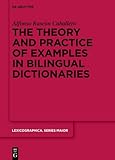The theory and practice of examples in bilingual dictionaries / Alfonso Rascón Caballero.
Material type: TextSeries: Lexicographica. Series Maior : Supplementbände zum Internationalen Jahrbuch für Lexikographie ; 165Publisher: Berlin ; Boston : De Gruyter, [2024]Copyright date: 2024Description: 1 online resource (XII, 317 p.)Content type:
TextSeries: Lexicographica. Series Maior : Supplementbände zum Internationalen Jahrbuch für Lexikographie ; 165Publisher: Berlin ; Boston : De Gruyter, [2024]Copyright date: 2024Description: 1 online resource (XII, 317 p.)Content type: - 9783111375618
- 9783111375809
- 9783111375649
- 413.028
- online - DeGruyter
- Issued also in print.
| Item type | Current library | Call number | URL | Status | Notes | Barcode | |
|---|---|---|---|---|---|---|---|
 eBook
eBook
|
Biblioteca "Angelicum" Pont. Univ. S.Tommaso d'Aquino Nuvola online | online - DeGruyter (Browse shelf(Opens below)) | Online access | Not for loan (Accesso limitato) | Accesso per gli utenti autorizzati / Access for authorized users | (dgr)9783111375649 |
Frontmatter -- Preface -- Contents -- Acknowledgements -- 1 Introduction -- 2 Preliminaries. Dictionaries for comprehension and production. Electronic dictionaries -- 3 Dictionary structures, textual condensation, and dictionary article components -- 4 Source, nature, and theoretical status of the dictionary example. The infralemma -- 5 Typology of dictionary examples -- 6 Functions of the dictionary examples -- 7 Example and meaning/equivalent -- 8 Example and grammar (morphology and syntax) -- 9 Example and word combinations (collocations) -- 10 Pragmatic aspects and example -- 11 Research on bilingual dictionary examples -- Bibliography -- Index
restricted access online access with authorization star
http://purl.org/coar/access_right/c_16ec
The dictionary example is the culminating component of the information presented in articles of dictionaries intended for language learning. This study analyses the example comprehensively: its provenance, its theoretical status, its distinction from multiword lexical units (to be presented as infralemmas), types and specific functions. The example not only illustrates the data provided by the definition, the equivalent, the grammatical, collocational and pragmatic items, but also provides valuable complementary information on the use of each lexical unit described. Examples are models with which users can form other sentences but are also instantiations of the language that escape systematicity and reflect unpredictable but real uses. Theoretical reflection on the theory of the example (with special emphasis on the bilingual), analysis of how (especially bilingual) dictionaries present examples and what kind of information each type of example provides can assist lexicographers in planning their dictionaries and making theoretically based choices when it comes to the selection and presentation of examples.
Issued also in print.
Mode of access: Internet via World Wide Web.
In English.
Description based on online resource; title from PDF title page (publisher's Web site, viewed 20. Nov 2024)


